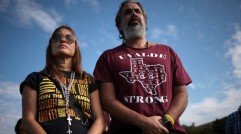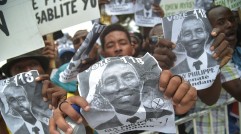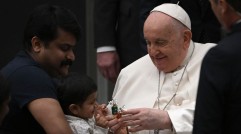Meet David Vetter: The Real Life Bubble Boy
David Vetter was born with Severe Combined Immune Deficiency (SCID) in September 1971.. It is a rare disorder that causes victims to be highly susceptible to severe, and sometimes fatal, infections.
Vetter was famously known for living his life in a plastic bubble, never touching the outside world. He had no functioning immune system since birth. Simply breathing normal air could have been lethal.
Doctors put David inside a plastic bubble seconds after he first drew breath. His parents were hoping the developing bone-marrow transplant could help him build an immune system. His sister, Katherine, volunteered to be the blood donor. Unfortunately, her blood was not a match, forcing the boy to live in the bubble permanently.
Life Inside the Bubble
David lasted far longer than other bubble babies. People could only reach out to him through plastic gloves attached to his bubble. Everything he received---including food, water, clothing, and even a small television, were sterilized before they were inserted through airlocks.
David's parents installed a similar chamber at his parent's house in Texas. In his bubble, he was allowed to go on a trip to a local movie theater. He attended a special screening of "Star Wars: Episode VI - Return of the Jedi."
When he was 6-years-old, the NASA gifted him with a special spacesuit. The suit allowed him to walk outside of his chamber. He did, however, remain connected to his bubble via a long tube. He lost interest in the suit after using it seven times.
Behind the Lens
David Vetter's life was a popular subject in the media. Throughout his life, he had become a star on television. Over time, ethical dilemmas surrounding his hermetic environment started accumulating.
A psychologist recalled how, on-camera, David would appear cheerful and happy. However, he was said to have raged at his fate behind the lens.
Carol, David's mother, said they believed in the ability of his doctors. She felt grateful for the bubble. Even if it was the only treatment option available, it still gave David twelve years to live.
"David's life was full of courage and understanding," she said. "He accepted his circumstances and was willing to wait until there was a way out of his chambers."
Death
In October 1983, David's doctors decided to try a new bone marrow technique where the blood donor was not required to be a perfect match. Katherine Vetter, his sister, was still the donor, as originally planned.
Initially, the procedure showed promising results. However, doctors discovered a dormant and undetected virus in Katherine's marrow---Epstein-Bar.
The Epstein-Bar virus is a common human virus that is spread through saliva. It can cause mononucleosis.
The virus triggered cancerous tumors in David's body. He was taken out of his bubble and received treatment in a sterile room. For the first time in his life, he received his mother's kiss---the most he has ever been into contact with anyone.
On February 22, 1984, David seemingly acknowledged that his death was imminent. The conscious and alert boy made jokes throughout the day and winked at his doctor before slipping into a sedated sleep.
At 8 PM, he was pronounced dead.
Before his death, David finally felt the touch of a hand unprotected by gloves. His mother also combed his hair.
David Vetter was buried in Conroe, a town he never got to experience. In his epitaph, his family wrote, "He never touched the world, but the world was touched by him."
Watch his story below:
Want to read more? Check these out:
- Two Florida Cold Case Murder Victims Identified After 30 Years
- Child Abuse Cases Down, Experts Warn Lockdown Measures Forces Victims to Silence
- Coronavirus Antibody Tests: A Possible Answer to the COVID-19 Test Gaps
Subscribe to Latin Post!
Sign up for our free newsletter for the Latest coverage!











